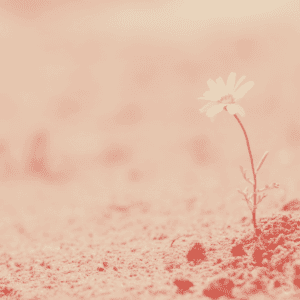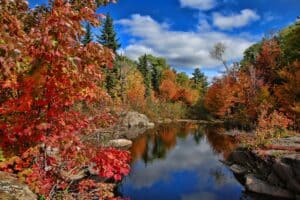For me, the summer of 2023 feels like the time when the climate crisis finally became impossible to ignore—which may simply mean that the climate crisis has started to impact me personally in more obvious ways. Maybe that’s selfish. It certainly stems from a place of privilege. But it’s where I’m at—and I doubt I’m alone.
 This summer, my Seattle-area homeland has experienced day after day of temperatures in the 80s and 90s, week after week of no rain. Depending on where you live, this may sound normal—mild, even. For us, it’s not normal. I grew up here, and I remember a time when summer was a mix of cool drizzly days, lovely days with highs in the 70s with a partial cloud cover, and the occasional drier week or hotter day. Planning an outdoor wedding, even in the middle of August, was a risk; you had to have a plan B in case of rain. Just before the temperatures finally cooled in late August, the wildfire smoke rolled in. Fires in Eastern Washington, British Columbia, and the Cascade Mountains. The unsettling haze on the horizon has become our new normal over the last couple of years. But it is not normal for us historically. And we haven’t yet adapted to it. People continue to recreate outdoors, not recognizing the impact on their health; not all buildings have adequate air purification systems, so being indoors is not necessarily an escape. The climate crisis has moved into our Seattle-area neighborhoods.
This summer, my Seattle-area homeland has experienced day after day of temperatures in the 80s and 90s, week after week of no rain. Depending on where you live, this may sound normal—mild, even. For us, it’s not normal. I grew up here, and I remember a time when summer was a mix of cool drizzly days, lovely days with highs in the 70s with a partial cloud cover, and the occasional drier week or hotter day. Planning an outdoor wedding, even in the middle of August, was a risk; you had to have a plan B in case of rain. Just before the temperatures finally cooled in late August, the wildfire smoke rolled in. Fires in Eastern Washington, British Columbia, and the Cascade Mountains. The unsettling haze on the horizon has become our new normal over the last couple of years. But it is not normal for us historically. And we haven’t yet adapted to it. People continue to recreate outdoors, not recognizing the impact on their health; not all buildings have adequate air purification systems, so being indoors is not necessarily an escape. The climate crisis has moved into our Seattle-area neighborhoods.
I recently read Not Too Late: Changing the Climate Story from Despair to Possibility, edited by Rebecca Solnit and Thelma Young Lutunatabua. The target audience, I think, is those of us who haven’t been deeply involved in the global climate movement but who want to be. Part of me doesn’t quite want to place myself in that category. As a Christian, I’ve believed for years that we humans have been called from the very beginning to steward the earth. But I haven’t always known what to do with this belief. I haven’t really connected myself with the global climate movement.
Maybe part of me still associates environmentalism with well-meaning white folks who often don’t get how the climate crisis is connected to all kinds of other justice issues—and who sometimes do more harm than good. But today’s environmentalist movement is different. Today’s leading environmentalists are young people of color from the countries hit first and worst by climate change. This is the leadership we need. This is the leadership I would like to follow. And these are the voices centered in Not Too Late.
I can sit in despair all I like, in my comfortable home, reading headlines about heat waves and hurricanes and rising sea levels and ocean acidification and melting glaciers and unprecedented wildfires—each year worse than the last. Maybe despair is a reasonable response, especially at first. But the writers of Not Too Late remind me that I don’t have to stay there. And for the sake of the most vulnerable now, and all of us in the not-terribly-distant future, the urgency of this moment calls me not to stay there.
It’s hard to look, to choose to know, to choose not to turn away in denial. There is grief. And we can—and must—make space to lament. But Not Too Late invites us to feel our feelings and to keep moving. To mourn but not despair. To acknowledge the losses that are too late to avoid, but not to assume we can’t prevent further loss.
In A Climate Scientist’s Take On Hope, Dr. Joëlle Gergis exhorts us: “You are living through the most profound moment in human history. Averting planetary disaster is up to the people alive right now.” No one is too young or too old—or too anything else—to exercise some sort of agency in this crucial moment. It’s up to us. We can rise up and declare that we will not sit idly and let the world burn. We can put pressure on our governments to do what scientists have determined we have to do: shut down fossil-fuel plants, electrify everything, and invest in clean, renewable energy. And we need to make that transition quickly before the climate crisis forces us to do so. We’re at a place right now where, according to Gergis, “every single metric ton of carbon dioxide we prevent from entering the atmosphere lessens the severity of the impacts we bake into the system.”
Every single metric ton makes a difference. That strikes me as terrifying, on the one hand—but also profoundly hopeful. If every ton makes a difference, maybe we can make a difference. “When you realize that the 2020s will be remembered as the decade that determined the fate of humanity,” Gergis writes, “you will tap into an eternal evolutionary force that has transformed the world time and time again. Recognizing you are part of a timeless tug of war for social justice electrifies the present moment in a way that brings meaning and purpose to our lives.” That’s what we need: the present moment electrified, so to speak. Tapping into an eternal transformative force. As Christians, we might call this the Holy Spirit— coming to save us, again and again. Coming to transform us, to guide us and move us to action, to move us toward justice. Inviting us to be part of something greater than ourselves—to participate in salvation, not just as individuals but as communities and as a whole planet.
We need this bigger vision. The writers of Not Too Late helped me see that when we only frame climate action in terms of what we as individuals can do, we get stuck in the mindset that we can only do less. Sure, it’s good to turn the lights off when we’re not using them. But this is not even the tip of the iceberg of our collective power. And it is exactly where the forces that care more about profit than human flourishing want us. As Rebecca Solnit writes, “Capitalism encourages us to imagine ourselves as consumers rather than citizens; authorities like us to believe we have no power. These perspectives leave us few options but to modulate our consumption—to change nothing but ourselves and merely implore the powerful to heed our wishes.” Activists like Solnit, Lutunatabua, Gergis, and the many other contributors to Not Too Late remind us that we have more power than we realize.
Together, we can co-create a different future from the one that might seem inevitable, the one that might easily elicit despair. Taking collective action to prevent the worst of climate change requires faith. But as a Christian, I know that faith the size of a mustard seed can move mountains (Matt 17:20). The powers-that-be—those who profit in the short term from the fossil-fuel consumption systems that are killing us all—want us to despair. But the writers of Not Too Late help us see a different way.
***
If you found this article helpful, you may also appreciate our initiative on Environmental Justice. Click here to discover how you can take faithful action to steward God’s creation.



